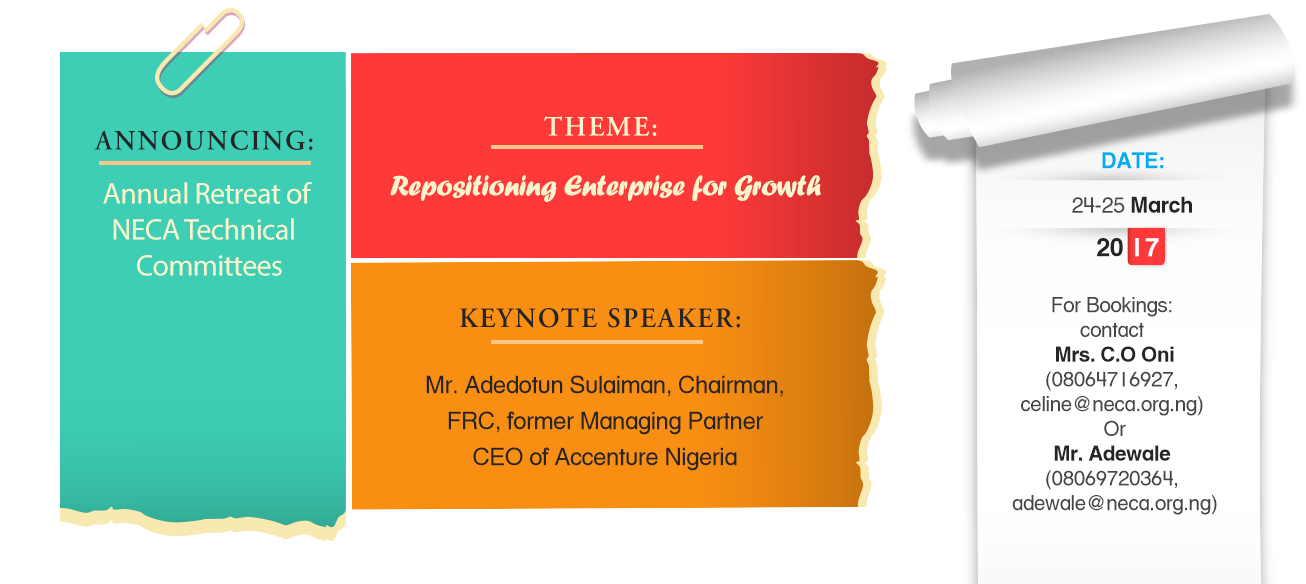BUSINESS ESSENTIALS Vol. 4 No 4
Dear Esteemed Member,
The decline in the nation’s economic growth in the past four quarter due to the dip in oil price, has elicited a response that is driving the new level of diversification and opening new opportunities for growth. This is expected to be very evident in the coming years ahead. Since Government’s revenue harvest from the effort is not expected to tumble in overnight, corporate entities would predictably be Government’s focus for revenue drive in the months ahead. We, therefore, reviewed “the Outlook for Tax Environment In 2017.
As you are probably aware, the CBN had directed Banks to commence illegal deductions from their customers’ accounts in lieu of transaction of N1, 000 and above. In the same vein, Nigeria Postal Service (NIPOST) had severally attempted to compel companies to affix a N50 postal stamp on all receipts, invoices and documents evidencing transaction of N1, 000 and above. NECA had opposed these attempt based on its illegality and in the light of pending litigation in the Courts on the matter. In view of the Federal Court of Appeal’s landmark ruling in the case between Kasmal International Services Limited and Access Bank and 23 others, which declared the deductions illegal, we had shared a recent press release by the Association on our demand to CBN to comply with the Court of Appeal’s ruling .
The regular Labour and Employment Law Review and 2017 Training Programmes were not left out. And on a lighter note we shared a Human Resource Humour tagged: How Many Days Do You Work In A Year?
Do have a pleasant reading.
Timothy Olawale
Editor
In this Issue:
- Outlook For Tax Environment In 2017: Based On Analysis Of Past Patterns
- Press Release: NECA demands CBN’s Compliance with Court of Appeal’s Ruling on N50 Stamp Duty
- LABOUR & EMPLOYMENT LAW: Review Of Some Significant Labour & Employment Cases In 2016
- HR HUMOR: How Many Days Do You Work In A Year?
- Upcoming Training Programmes
OUTLOOK FOR THE TAX ENVIRONMENT IN 2017: BASED ON ANALYSIS OF PAST PATTERNS
We often have new hopes and high expectations at the turn of new events including the turn of a new year regardless of past experiences and notwithstanding our current reality. As a country, Nigeria has expectations for tax and so are individuals and organisations. To a large extent and under normal circumstances, tax should be relatively more predictable given that the rules and administration are totally within the control of appropriate authorities. Unlike attempting to predict the weather for a whole year or other natural and supernatural events.
Tax Policy
There is a revised National Tax Policy awaiting government approval for implementation. It is expected that the Policy will be approved and implementation will commence but with very little traction due to vested interests and insufficient buy-in from those who need to make the required changes.
The 2017 Budget of the Federal Government of Nigeria and the 2017-2019 Medium Term Expenditure Framework have no specific proposals to increase tax rates or impose new taxes in 2017. The budget speech was silent on key tax policies but stated a commitment to align fiscal, monetary and trade policies. There are plans to revive the Export Expansion Grant (EEG) scheme.
Government will focus on measures to discourage imports which suggest that import duties and waivers may be revised. Already we have seen a revision in some duty rates announced towards the end of 2016 partly designed towards the implementation of the new ECOWAS Common External Tariffs regime and the return of Withholding Tax (WHT) for the Construction and Building Industry to 2.5%. The ongoing review of tax incentives will be completed and should have a positive impact on government revenue if it addresses current abuse and plug existing leakages.

Tax Administration
Government is less bullish about non-oil revenue in 2017 compared to 2016 given the recent abysmal performance. It is expected that due to losses being reported by many companies in addition to other tax attributes such as unutilised capital allowances, the government tax take will be lower than anticipated especially from Companies Income Tax.
VAT collection is likely to improve partly due to the impact of the government social welfare scheme of conditional cash transfer and increased enforcement of compliance by FIRS but will still perform much below its potentials. The aggressive stance by government at all levels will continue and intensify. In addition to imposition of stiff penalty and interest there is likely to be criminal prosecutions. Guidelines from the FIRS will continue to be hazy and request for rulings and direction by taxpayers may not receive prompt attention.
Internally generated revenue drive will continue to be on the front burner but still only an insignificant progress will be made due to the haphazard approach and the prevailing harsh economic condition. It is counter-intuitive that many politicians play politics with revenue generation by placing political considerations ahead of professionalism. Unfortunately many lawmakers, administrators and policymakers lack proper understanding of the tax system. This coupled with undue political interference and vested interests mean that tax revenue will continue to be disappointingly low.
The FCT Internal Revenue Service will make some progress towards the full implementation of its mandate. Adoption and implementation of e-tax systems by various tax authorities will continue to be slow and ineffective. More stakeholders will trigger the necessary provisions of the Freedom of Information Act to request for relevant information on tax administration, spending and expenditure control.
Some of the initiatives by the FIRS such as joint audit and use of consultants will continue to face implementation hurdles and unlikely to yield any major results. A number of tax authorities will introduce tax amnesty in order to expand the tax net and encourage voluntary compliance.
Tax Regulation
There will be some progress with the restructured Petroleum Industry Bill (PIB) with a high possibility for the governance framework being passed into law but other aspects of the Bill which are more controversial including the fiscal regime, derivation formula and host community issues will remain unresolved. The proposed 9% Communication Service Tax will not see the light of day in its current form due to public resistance, bad timing which may be considered as insensitive and poor articulation of the justifications for the tax.
There will be some efforts to begin a comprehensive tax law review in 2017. The attempt to broaden the scope of stamp duty to cover savings account deposits, among others, will not yield any positive result as well as the plan to charge VAT on international passports.
Nigeria will sign more tax treaties for the avoidance of double taxation but ratification at the National Assembly necessary to domesticate the treaties will continue to be slow.
Tax Justice
The Tax Appeal Tribunal will be reconstituted. The aggressive level of tax audits by tax authorities especially the progress being made by the FIRS regarding transfer pricing reviews will lead to more disputes and hence a rise in tax appeal cases.
More tax disputes will be resolved in favour of taxpayers due to untenable positions taken by the tax authorities. The judiciary will generally continue to struggle with proper and timely dispensation of tax cases due to lack of in-depth tax knowledge especially in more complex situations and evolving areas.
The new ECOWAS Common External Tariff scheme will continue to experience poor implementation by member countries thereby undermining the regional integration efforts.
OPINION
Just in case you do not have any New Year resolutions for tax, you need to commit to paying your taxes correctly and on time. Tax will not just be a compliance matter but a business continuity and sustainability issue. More importantly, as a taxpayer you must hold government accountable for the taxes paid. This will create more tax awareness and citizen engagement.
Overall, the tax journey in 2017 will be bumpy but we are cautiously optimistic that it will end in safe landing albeit with some bruises.
Extracts in part was culled from PWC Newsletter
PRESS RELEASE: NECA demands CBN’s Compliance with Court of Appeal’s Ruling on N50 Stamp Duty
NIGERIA Employers Consultative Association, NECA, has expressed serious concern over the failure of the Central Bank of Nigeria (CBN) to comply with the Court of Appeal’s ruling in the matter between Kasmal International Services Limited and Access Bank and 23 others, by directing all Deposit Money Banks (DMB) to discontinue the illegal charging of N50 per transaction in lieu of Stamp Duties.
It would be recalled that the CBN had directed Banks to commence the illegal deductions which did not only affect Corporate Bodies but all Nigerians, including the very vulnerable ones. NECA and Organised Businesses had opposed attempts by the Nigeria Postal Service (NIPOST) to compel companies to affix a N50 postal stamp on all receipts, invoices and documents evidencing transaction of N1, 000 and above. NECA had also kicked against the CBN’s directive to Banks based on its illegality and in the light of pending litigation in the Courts on the matter.
NECA, in a press statement by its Director General, Mr. Segun Oshinowo, noted that there has been a landmark ruling in the case at the Court of Appeal on this subject matter between Kasmal International Services Limited and Access Bank and 23 others, which declared the deductions illegal.
The statement read in part: “The Nigeria Employers’ Consultative Association (NECA) has expressed grave concern over the failure of the Central Bank of Nigeria (CBN) to reverse its earlier directives to all Deposit Money Banks (DMB) to halt the charging of N50 per eligible transaction in accordance with the assumed provisions of the Stamp Duties Act and Federal Government Financial Regulations (2009). The CBN is hereby advised to do the needful without delay by directing cessation of further deductions and commence the refund of all accrued deductions in the past to their customers”.
NECA urges the Buhari administration to restrain its operatives from pursuing policies that will increase the burden on the citizenry both corporate and individuals. It affirmed that Stamp Duty’s applicability is limited to purchases involving large sums like a house purchase or importation of goods as against the position of applying N50 postage stamp to all receipts given by any bank (or financial institution) in acknowledgement of services rendered in respect of electronic transfer and teller deposits.”
………………………………………………………………………………………………………………..
LABOUR & EMPLOYMENT LAW: REVIEW OF SOME SIGNIFICANT LABOUR & EMPLOYMENT CASES IN 2016
Introduction
The year under review was eventful with regards to adjudication of disputes on Labour and Employment matters. The National Industrial Court of Nigeria (NICN) took the center stage to address and resolve issues and disputes between Employers and Employees. In 2016, significant numbers of cases were decided by the NICN and some principles are set and/or reaffirmed. Some these are:
- a) Enforceability of Contractual Restrictions on Freedom to Conduct Business (Restraint of Trade)
In Studio Press (Nig.) Plc vs. Garnesh Kadoor & Anor, a restraint of trade clause restricting the activities of an employee for upward of 2 years after termination of employment was held enforceable. The former employee was held liable in damages and consequently restrained from continuing in his employment with his new employer (sued as 2nd defendant).
In Overland vs. Captain Jam, the court held that contracts in restraint of trade are distinguishable from training bonds. On the enforceability of the latter, it maintained that the practice of executing training bonds is generally enforceable but becomes unenforceable when such bonds are proven to be penalty bonds i.e. excessive stipulated damages.
- b) New Dispensation to Labour and Employment Matters
The Court in Olufemi Amodu vs. Epesok Paper Mill Ltd noted that the old dispensation of cases which insisted on the measure of damages in termination/dismissal being restricted to only payment in lieu of notice, typifies the stance of common law on the matter, which is not necessarily the case today. The Court, relying on section 254C of the Third Alteration to the 1999 Constitution, as amended, held that the court may where necessary make any appropriate order, including “an award of compensation or damages in any circumstances contemplated by the Act or any Act of the National Assembly dealing with any matter that the court has jurisdiction to hear”.
- c) Compensatory Damages (Jurisdiction to award substantial damages to meet the justice of the case)
In Solomon Jude vs. Nigeria Bottling Co. Plc, the claimant sought the sum of N90million for injury (lost of a finger). The court held that “although he is entitled to compensation for the loss of his finger, this court considers the sum claimed as being unrealistic, considering that the missing finger does not prevent the claimant from using the hand as a whole. The effect of the lost finger to the productivity of the hand does not necessarily justify the sum of N90,000,000.00 claimed by the claimant. From my assessment, the sum of N500,000.00 will be adequate compensation to the claimant”.
A wrongfully dismissed complaint was awarded compensatory damages approximating his 6 months’ salary in Mr. Gabriel Ologun vs. Benaiz Health Care Ltd
In Mr. I. N. Orok & Ors vs. Lagos University Teaching Hospital Management Board, the court awarded compensatory damages equivalent to 2 years salary to each of the Claimants, the basis for compensation being that their salaries and entitlements had been withheld for a period of 16 years.
The court found that the investigation process leading to the summary dismissal of the claimant in Mrs. Titilayo Akinsanya vs. Coca-Cola Nig. Ltd & Anor, was wrongful and awarded among others compensatory damages of 1 year’s gross salary to the claimant. There was also another critical point in that case: For an employee to complain of absence of fair hearing in terms of the disciplinary process leading to his/her termination/dismissal, the employee must have raised the complain during the disciplinary process and not for the first time when an action is filed.
- d) Workers Protection
In Mr. Adewale Aina vs. Wema Bank Plc & Anor, the NICN clarified the new position; finding that whether dismissal is earned or not, the new dispensation is that all earnings of an employee prior to the dismissal must be paid by the employer to such an employee.
Still on the new dispensation of applying principles of fairness and equity to ameliorate the rigidity of old common law rules, collective agreements which are incorporated into contracts of services, are by the stated intent of the Third Alteration to the 1999 Constitution, enforceable and binding. See Mr. Valentine Ikechukwu Chiazor vs. Union Bank of Nigeria Plc
Conclusion
The pronouncement of the NICN continued to contribute to the development of Labour & Employment Laws and Practices in Nigeria. It is expected that 2017 would witness more judgments from the NICN.
Finally, there is no right of appeal against the final decision of the National Industrial Court of Nigeria except on issues of Fundamental Human Rights.
In an application for enlargement of time to file a Notice of Appeal against a decision of the NICN, the Court of Appeal, sitting in Lagos in the case of Darnley Anifowoshe vs. Wema Bank Plc (2015) reaffirmed the position of the law that by the combined effect of section 9 of the NICN Act, Section 5 (2) (3) and (4) of the Constitution (Third Alteration), and section 243 of the 1999 Constitution (as amended) there is, as at yet, no right of appeal against the final decision of the NICN except on issues of Fundamental Human Rights.
Another exception is criminal cases as they relate to matters upon which the NICN has jurisdiction. As to other causes or matters not so specified, appeal shall only lie from decisions of the NICN to the Court of Appeal as may be prescribed by an Act of the National Assembly and such appeal shall be with leave of the Court of Appeal.
HR HUMOR: How Many Days Do You Work In A Year?
After 4 years of selfless service, I realized that I had not been promoted, no salary increment, no commendation. So I decided to walk up to my HR Manager. The Manager looked at me, smiled and asked me to sit down saying: “My friend you have not worked here for even a single day.”
I was shocked to hear this!!!, but the Manager went on to explain, and here’s the conversation that took place.
Manager: How many days are there in a year?
Me: 365 days and sometimes 366.
Manager: Do you come to work on weekends?
Me: No sir.
Manager: How many days are there in a year that is weekends?
Me: 52 Saturdays and 52 Sundays equals to 104 days.
Manager: Thanks for that. If you remove 104 days from 366 days, how many days
do you now have?
Me: 262 days
Manager: How many hours make up a day?
Me: 24 Hours.
Manager: How long do you work in a day?
Me: 10am to 6pm (i.e 8 hours a day.)
Manager: So, what fraction of the day do you work in hours?
Me: 8/24 i.e 1/3 (one third).
Manager: This is nice of you! What is 1/3rd of 262 days?
Me: 87 (1/3 x 262 = 87days)
Manager: I do give you 2 weeks sick leave; 15 days casual leave, 5 days optional leave, 30 days earned leave every year. Now remove that 64 days from the 87 days left. How many days do you have remaining?
Me: 23 days.
Manager: Do you work on festivals? (20 days)
Me: No Sir!
Manager: Do you work on Democracy Day?
Me: No sir!
Manager: Do you come to work on Independence Day?
Me: No sir!
Manager: So how many days r left?
Me: 1 day sir!
Manager: Do you come to work on New year’s day..?
Me: No sir..!!
Manager: So how many days are left?
Me: None Sir!
Manager: So what are you claiming?
Me: I have understood, Sir. I did not realise that I was stealing company
money all these days.
Moral – NEVER GO TO HR FOR HELP!!! (HR = HIGH RISK.). So, how many days do you work?
– This is a joke and not to be taken serious please.
Learning & Development Experts Forum
Date: 9 February 2017
Duration: ½ Day
Venue: NECA Learning Centre
Course Fee: Members: Free Non- Members: N5,500
Management Skills Development for New Managers
Date: 16 – 17 March 2017
Duration: 2 Days
Venue: NECA Learning Centre
Course Fee: Members: N82,500; Non- Members: N87,500
Annual Retreat of NECA’s Technical Committees
Date: 24 – 25 March 2017
Duration: 2 days
Venue: Park Inn by Radisson, Abeokuta, Ogun State.
Course Fee: Members: N85,000; Non- Members: N90,000
For further details please contact Adewale (08069720364) adewale@neca.org.ng
Visit www.neca.org.ng






Recent Comments